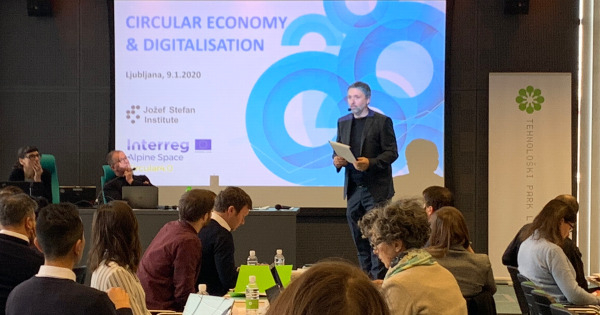Digital transformation is a precondition for a circular economy
22. 01. 2020

Transnational kick-off meeting, Circular4.0 (Interreg Alpine Space), Ljubljana (Slovenia)
From 9th to 10th January 2020, Technology Park Ljubljana (TPLJ) hosted Circular4.0 partner´s meeting, which at the transnational level encourages the transition of companies to a circular economy (CE) in the Alpine region through the processes of digital transformation.
On the project, Circular4.0 collaborate with fifteen project partners including twenty-three observers from five countries (Austria, Germany, France, Italy, and Slovenia). TPLJ from Slovenia is a Lead partner of the project. Other collaborating project partners are TUAS Rosenheim, BWCON, AWS, ITG, Biz-UP, VI, Grand E-now, AURAE, JSI, TOWL, CONFBG, CCIAA Venezia Rovigo, UCB, and RISINGSUD. The project started at the beginning of October 2019 and it will last until the end of June 2022. Circular4.0 is co-financed by the European Regional Development Fund via Interreg Alpine Space.
Circular4.0 objective is to improve the Alpine eco-system of innovation and to contribute to the transition to a circular economy in the Alpine area by SMEs and economic operators, exploiting the potential and the added value of the digitalization processes by SMEs.
Transnational working groups will be established and will work all projects along with the aim to promote the implementation of the circular economy so that the use of digital technologies will enable the faster transition of SMEs to the circular economy.
Through the project, a set of tools will be developed and tested within three models the circular design model, optimal use model, value recovery model.
Circular4.0 will increase the knowledge and raise the awareness of SMEs, policymakers, intermediaries on the circular economy (CE) with the contribution of Industry4.0.
Within the kick-off meeting, the first invited guest Jurij Giacomelli from Giacomelli Media outlined the concept of addressing the challenges of the transition to a circular economy and the importance of a sustainable circular economy concept for the wider society. "We usually understand that sustainability has only economic dimensions, and we forget that social and environmental aspects are very present," said Giacomelli, who also emphasized that innovation will only ensure the well-being and sustainable life of our future generations, taking into account the above-mentioned concepts. “In his opinion, half of the total contribution to reducing CO2 emissions should come from the results of the circular economy. “At the moment, our world is only 9% circular,” he explained.
Challenges and Opportunities of the EU and the Alpine Space
Jurij Giacomelli also stressed that, first and foremost, we need to understand the specificities of the region and the challenges that it brings. We should support innovations, but we must not forget the potential risks. Keeping track of existing businesses and learning from those who are good at it is an advantage. We need to attract investors and those who contribute to an efficient and evolving ecosystem in the Alpine Space.
Instead of subsidies, we need innovation
“Our goal is to contribute to the ecosystem in the Alpine region. With the help of Circular4.0, we will increase our knowledge on circular design models and optimal usage models, thereby attracting entrepreneurs' attention in the transition to a circular economy," he said.
Improvements will optimize production processes in the Alps
The next guest of the kick-off meeting Rudi Panjtar from Jozef Stefan Institute presented the connection between digital transformation and the circular economy and pointed out the need for many changes. 80% of usable products and their materials are discarded without being used for other purposes. "Technology provides new solutions and the circular economy creates technological needs," he added.
Support for circular economy projects in Ljubljana is great
The last guest of the kick-off meeting Zala Strojin Božič from the City of Ljubljana presented the vision of the circular economy in 2025. In Ljubljana, support for circular economy projects is great. They strive to use and purchase sustainable products and carry out public calls for sustainable ideas. Recently, new “zero waste” stores, used clothing stores and many new projects of this kind have opened in the city.
One of their best projects is Applause, which deals with the usability of 25 species of plants. In order to facilitate the identification and recording of species in the space, they carry out a number of activities within the project: they develop an application for independent identification of 25 plant species, made shorter films about the characteristics of these species and methods of disposal, for 15 plant species made 3D models in physical and interactive form, in the Ljubljana area, during the project, they organize voluntary campaigns for the removal of invasive plants.
On the project, Circular4.0 collaborates with fifteen project partners including twenty-three observers from five countries (Austria, Germany, France, Italy, and Slovenia). TPLJ from Slovenia is a Lead partner of the project. Other collaborating project partners are TUAS Rosenheim, BWCON, AWS, ITG, Biz-UP, VI, Grand E-now, AURAE, JSI, TOWL, CONFBG, CCIAA Venezia Rovigo, UCB, and RISINGSUD. Circular4.0 is co-financed by the European Regional Development Fund via Interreg Alpine Space.

